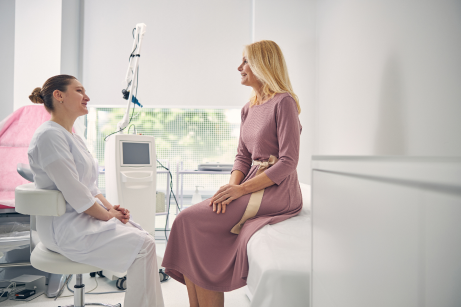Now that you've chosen a clinical trial, you might wonder what comes next. Each trial has its own requirements, so it's important to review the study protocol carefully.

This clinical trial visit preparation guide offers general tips for first-time participants to help you prepare for a screening visit. The Haltha Connect team will provide all necessary paperwork and guide you through the process, but here’s a quick overview of what to expect before your appointment.
The process of enrolling and participating in a clinical trial requires careful preparation to ensure a smooth and successful experience. The importance of being prepared cannot be overstated. It has a great impact on the overall outcome of the trial.
Clinical trials can be complex, with specific protocols, eligibility criteria, and procedures participants are to adhere to. So take the time to thoroughly review the trial's details to have a clear idea of what will be expected of you throughout the clinical research screening process.
Medical studies often have strict inclusion and exclusion criteria that all participants must meet to be eligible for enrollment. Carefully review these requirements to save your time and avoid the frustration of being disqualified from the trial.
The screening process involves a series of assessments, tests, and interviews to determine the participant's suitability for the trial. As you check the details of screening procedures and gather the necessary information, you can feel more comfortable and ready for the screening process. After all, there is nothing worse than the feeling of uncertainty.
Clinical trial screening preparation is a must-have thing for all who want to take part in a study. This step ensures a positive and meaningful experience for both researchers and trial participants. It enhances understanding, ensures compliance with necessary requirements, and builds confidence among all parties involved.
TESTIMONIAL

When participating in a study, it is important to come prepared and know what to bring to clinical trial visit. Stick to this clinical trial study start-up checklist to ensure that you have everything you need for a smooth and successful experience:
A valid government-issued ID (driver’s license, passport). It is necessary to identity verification and record-keeping purposes.
Copies of your complete medical records, including your current prescriptions, ongoing treatments, and any relevant medical history. These records will help the research team understand your health status and any potential impact on the trial.
A detailed list of all medications, supplements, and over-the-counter drugs you are currently taking. This information is crucial for the researchers to assess any potential interactions or contraindications.
Your health insurance card, even if the clinical trial covers the costs associated with your participation. This is necessary to streamline any reimbursement or billing processes.
A written list of your allergies, medical history, and prior surgeries.
A written summary of your medical history, including any known allergies, past surgeries, and any other relevant health information. This will aid the researchers in evaluating your eligibility and assessing any potential risks.
Any consent forms or other paperwork provided to you prior to the trial.
Beyond this first clinical trial checklist, make sure that you review what documents to bring to clinical trial carefully and bring them with you to the first appointment.
Besides that, we recommend that you prepare some additional items for your comfortable and smooth experience:
In case you have not time for preparing for a clinical research visit, then you can always reach out to the Haltha Connect team for help.
During a typical clinical trial screening, you can expect the following:
The trial team will run an in-depth review of your medical records and thoroughly question you about your health history. They will inquire about any past or current medical conditions, hospitalizations, surgeries, allergies, and medications you are taking.
A healthcare professional will measure your vital signs, such as blood pressure, heart rate, temperature, and respiratory rate. They will check your height, weight, and body mass index (BMI). Some additional tests may be performed as well. For example, an electrocardiogram (ECG) may be necessary to evaluate your heart function or a neurological exam to assess your cognitive abilities and reflexes.
These may include a complete blood count (CBC) to check your overall blood cell levels, a comprehensive metabolic panel to assess your organ function, and tests for specific biomarkers or genetic markers related to the condition under investigation.
You will be asked to complete a detailed questionnaire about your lifestyle habits, dietary patterns, and mental health. This information helps the researchers understand your overall health status.
Besides that, the clinical team will explain the purpose, procedures, potential risks, and possible benefits of the trial to you. They will address any questions or concerns you may have to ensure you fully understand the informed consent document. If you agree to participate, you will be asked to sign the consent form.
Key Tip nr 1
Payments for participants are deposited directly into their bank accounts. This method is more popular in larger and longer studies since it reduces delays in payments.
As a potential participant, you need to ensure that you fully understand the study and your role in it. To help you make the most of your first clinical trial screening, here is the clinical trial site selection checklist of questions you should consider asking:
What are the possible risks and side effects of this trial?
(Be aware of the potential risks involved. Thus, you can decide whether the trial is ok for you.)
How often will I need to visit the clinic?
(It is important to understand the time commitment required. Frequent visits may impact your daily routine and responsibilities.)
What happens if I decide to withdraw from the study?
What happens if I decide to withdraw from the study?
Will I be reimbursed for travel or time?
(It is always good to know if the study provides money for your participation.)
How will this study impact my current medications or treatments?
(Discuss any potential interactions or conflicts with your healthcare regimen.)
Who should I contact if I experience any issues during the trial?
(Establish a clear point of contact for reporting any concerns or problems that may arise.)
What procedures will I need to undergo during the trial?
(Understand the full scope of medical tests, examinations, and other procedures involved.)
What happens if the trial is delayed or canceled?
(Inquire about the protocol for such scenarios and how it may affect your participation.)
To help you remember what to ask at clinical trial screening and have them on hand during your visit. With the clinical trial checklist at hand, you can ensure that you cover all the crucial points.
To ensure you have a positive experience and get the most out of the process, it’s important to properly prepare yourself in the days leading up to the appointment. This should definitely be a part of your medical trial visit checklist.

Getting adequate rest in the days before your screening is crucial. Many tests require focus, patience, and mental acuity. So being well-rested will help you perform at your best. Aim to get 7-9 hours of pquality sleep each night in the 2-3 days leading up to your appointment. Avoid late nights, limit screen time, and establish a calming bedtime routine to ensure you are refreshed and rejuvenated.

Getting adequate rest in the days before your screening is crucial. Many tests require focus, patience, and mental acuity. So being well-rested will help you perform at your best. Aim to get 7-9 hours of pquality sleep each night in the 2-3 days leading up to your appointment. Avoid late nights, limit screen time, and establish a calming bedtime routine to ensure you are refreshed and rejuvenated.

Getting adequate rest in the days before your screening is crucial. Many tests require focus, patience, and mental acuity. So being well-rested will help you perform at your best. Aim to get 7-9 hours of pquality sleep each night in the 2-3 days leading up to your appointment. Avoid late nights, limit screen time, and establish a calming bedtime routine to ensure you are refreshed and rejuvenated.

Getting adequate rest in the days before your screening is crucial. Many tests require focus, patience, and mental acuity. So being well-rested will help you perform at your best. Aim to get 7-9 hours of pquality sleep each night in the 2-3 days leading up to your appointment. Avoid late nights, limit screen time, and establish a calming bedtime routine to ensure you are refreshed and rejuvenated.

Getting adequate rest in the days before your screening is crucial. Many tests require focus, patience, and mental acuity. So being well-rested will help you perform at your best. Aim to get 7-9 hours of pquality sleep each night in the 2-3 days leading up to your appointment. Avoid late nights, limit screen time, and establish a calming bedtime routine to ensure you are refreshed and rejuvenated.





After the initial screening process for a clinical trial, there are several key steps that typically follow:
Once you have completed the initial screening, the research team will carefully review all of your test results, medical history, and other relevant information. Depending on the complexity of the study and the volume of applicants, this review process can take anywhere from a few days to a couple of weeks. During this time, it’s important to be patient and await the team’s decision on your eligibility.
If the review process determines that you are indeed eligible to participate in the clinical study, the research team will reach out to you with detailed instructions on the next steps. This will likely involve additional paperwork, scheduling of appointments, and a more comprehensive informed consent process.
Once you have completed all of the necessary pre-enrollment steps and have been formally accepted into the clinical trial, you can start your participation. This is typically regular clinical visits, medical tests and assessments, and the administration of the investigational treatment or intervention being studied. The research team will guide you through every aspect of your participation to ensure your safety and comfort throughout the process.
Key Tip nr 2
During the waiting period after your initial screening, ask the research team how long it typically takes to hear back about eligibility decisions. It is also a good idea to inquire about any recommended activities or preparations you can undertake while awaiting the final determination.
Yes, participants have the right to withdraw from a clinical trial at any time, for any reason, without facing penalties or repercussions. Your safety and well-being are a top priority.
Usually, you cannot engage in more than one clinical study at once as possible interactions between many therapies affect the safety and integrity of the research. Once you have finished one, however, you might be qualified to take part in another.
To participate in a clinical trial, you can start by exploring live studies in your area or creating an account with us to match your profile with our studies.